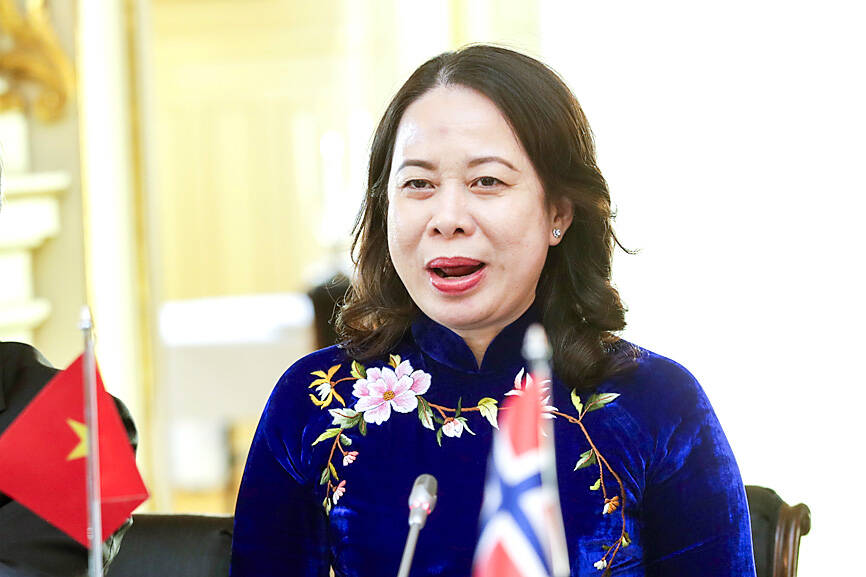The National Assembly of Vietnam yesterday appointed Vice President Vo Thi Anh Xuan as acting head of state, after Vietnamese President Vo Van Thuong became the latest top official to fall amid an intensified corruption crackdown by the Communist Party of Vietnam.
Thuong, 53, was removed from the powerful Politburo for unspecified breaches of party rules, becoming the second president to exit in just more than a year in Vietnam, where leadership changes have recently all been linked to a wide-ranging “blazing furnace” anti-bribery campaign.
Xuan, one of only a few women in senior positions in Vietnamese politics, steps in as president for the second time in just more than a year.

Photo: AP
“The Politburo has assigned Vo Thi Anh Xuan as acting president ... until the National Assembly elects a new president, in accordance with Vietnam’s constitution,” online newspaper VnExpress reported.
The government also confirmed her appointment.
The president holds a largely ceremonial role, but is one of the top four political positions in the Southeast Asian nation.

Photo: AFP
Xuan filled the void in the six weeks after Nguyen Xuan Phuc stepped down as president last year for “violations and wrongdoing” by officials under his control.
Thuong was widely regarded as being close to Vietnamese General Secretary Nguyen Phu Trong, the nation’s most powerful figure and architect of an anti-graft campaign that intensified recently.
The party’s Central Committee on Wednesday accepted Thuong’s resignation and removed him from the Politburo, its top decisionmaking body, and his position of head of the National Defense and Security Council. About 88 percent of lawmakers supported his removal as president in yesterday’s vote.
The committee said Thuong’s shortcomings “had negatively impacted public opinion, affecting the reputation of the Party, State and him personally,” without elaborating on what he had done wrong.
Foreign investors and diplomats have blamed the sweeping crackdown for slowing decisions in a country already grappling with cumbersome bureaucracy.
Analysts say the current malaise could be resolved with the swift election of a new president, but risks remain that repeated reshuffles of top leaders could hurt business sentiment in a nation that is highly dependent on foreign investment.
The legislature could announce a new president when it holds its next regular plenary session in May, or earlier if a special meeting is convened.
The US embassy in Hanoi said Washington “is confident that the positive momentum in our bilateral relationship will continue as we implement our Comprehensive Strategic Partnership.”

Taiwanese Olympic badminton men’s doubles gold medalist Wang Chi-lin (王齊麟) and his new partner, Chiu Hsiang-chieh (邱相榤), clinched the men’s doubles title at the Yonex Taipei Open yesterday, becoming the second Taiwanese team to win a title in the tournament. Ranked 19th in the world, the Taiwanese duo defeated Kang Min-hyuk and Ki Dong-ju of South Korea 21-18, 21-15 in a pulsating 43-minute final to clinch their first doubles title after teaming up last year. Wang, the men’s doubles gold medalist at the 2020 and 2024 Olympics, partnered with Chiu in August last year after the retirement of his teammate Lee Yang

FALSE DOCUMENTS? Actor William Liao said he was ‘voluntarily cooperating’ with police after a suspect was accused of helping to produce false medical certificates Police yesterday questioned at least six entertainers amid allegations of evasion of compulsory military service, with Lee Chuan (李銓), a member of boy band Choc7 (超克7), and actor Daniel Chen (陳大天) among those summoned. The New Taipei City District Prosecutors’ Office in January launched an investigation into a group that was allegedly helping men dodge compulsory military service using falsified medical documents. Actor Darren Wang (王大陸) has been accused of being one of the group’s clients. As the investigation expanded, investigators at New Taipei City’s Yonghe Precinct said that other entertainers commissioned the group to obtain false documents. The main suspect, a man surnamed

The government is considering polices to increase rental subsidies for people living in social housing who get married and have children, Premier Cho Jung-tai (卓榮泰) said yesterday. During an interview with the Plain Law Movement (法律白話文) podcast, Cho said that housing prices cannot be brought down overnight without affecting banks and mortgages. Therefore, the government is focusing on providing more aid for young people by taking 3 to 5 percent of urban renewal projects and zone expropriations and using that land for social housing, he said. Single people living in social housing who get married and become parents could obtain 50 percent more

DEMOGRAPHICS: Robotics is the most promising answer to looming labor woes, the long-term care system and national contingency response, an official said Taiwan is to launch a five-year plan to boost the robotics industry in a bid to address labor shortages stemming from a declining and aging population, the Executive Yuan said yesterday. The government approved the initiative, dubbed the Smart Robotics Industry Promotion Plan, via executive order, senior officials told a post-Cabinet meeting news conference in Taipei. Taiwan’s population decline would strain the economy and the nation’s ability to care for vulnerable and elderly people, said Peter Hong (洪樂文), who heads the National Science and Technology Council’s (NSTC) Department of Engineering and Technologies. Projections show that the proportion of Taiwanese 65 or older would